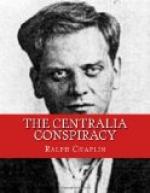Britt Smith and Roy Becker told with bated breath about Everest as he lay half-dead in the corridor, in plain sight of the prisoners in the cells on both sides. The lights went out and Everest, unconscious and dying, was taken out. The men inside could hear the shouts of the mob diminishing as Everest was hurried to the Chehalis River bridge.
[Illustration: Bert Bland
Logger. American. (Brother of O.C. Bland.) One of the men who fired from Seminary Hill. Bland has worked all his life in the woods. He joined the Industrial Workers of the World during the great strike of 1917. Bert Bland took to the hills after the shooting and was captured a week later during the man hunt.]
None of the prisoners was permitted to sleep that night; the fear of death was kept upon them constantly, the voices outside the cell windows telling of more lynchings to come. “Every time I heard a footstep or the clanking of keys,” said Britt Smith, “I thought the mob was coming after more of us. I didn’t sleep, couldn’t sleep; all I could do was strain my ears for the mob I felt sure was coming.” Ray Becker, listening at Britt’s side, said: “Yes, that was one hell of a night.” And the strain of that night seems to linger in their faces; probably it always will remain—the expression of a memory that can never be blotted out.
When asked if they felt safer when the soldiers arrived to guard the Centralia jail, there was a long pause, and finally the answer was “Yes.” “But you must remember,” offered one, “that they took ’em out at Tulsa from a supposedly guarded jail; and we couldn’t know from where we were what was going on outside.”
“For ten days we had no blankets,” said Mike Sheehan. “It was cold weather, and we had to sleep uncovered on concrete floors. In those ten days I had no more than three hours sleep.”
“The mob and those who came after the mob wouldn’t let us sleep. They would come outside our windows and hurl curses at us, and tell each of us it would be our turn next. They brought in Wesley Everest and laid him on the corridor floor; he was bleeding from his ears and mouth and nose, was curled in a heap and groaning. And men outside and inside kept up the din. I tried to sleep; I was nearly mad; my temples kept pounding like sledge-hammers. I don’t know how a man can go through all that and live—but we did.”
All through the night the prisoners could hear the voices of the mob under their cell windows. “Well, we fixed that guy Everest all right,” some one would say. “Now we’ll get Roberts.” Then the lights would snap off, there would be a shuffling, curses, a groan and the clanking of a steel door. All the while they were being urged to “come clean” with a statement that would clear the lumber trust of the crime and throw the blame onto its victims. McInerney’s neck was scraped raw by the rope of the mob but he repeatedly told them to “go to hell!” Morgan, the stool-pigeon, escaped the torture by immediate acquiescence. Someone has since paid his fare To parts unknown. His “statement” didn’t damage the defense.




